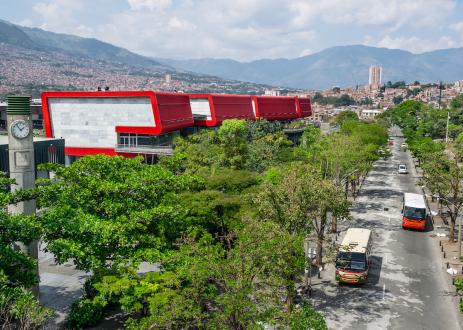拉丁美洲和加勒比海的基于自然的解决方案:区域地位和增长的优先事项
This paper discusses how the Latin American and Caribbean region is on the verge of a transition from experimenting with nature-based solutions (NBS) to adopting it on a much wider scale that can transform infrastructure planning and investments for the better. NBS can contribute to equitable and sustainable development across this region, and can provide benefits to multiple sectors and societal challenges.

As the world recovers from the global recession and pandemic, investment in development projects and infrastructure is poised to surge. But channeling that investment into traditional infrastructure, often built with concrete and steel, risks accelerating greenhouse gas emissions, climate change, environmental degradation, and biodiversity loss. This means that many proposed carbon-intensive recovery investments are more likely to deepen inequality and undermine future economic growth.
Yesterday’s infrastructure strategies cannot protect communities and economies from today’s multiplying threats. Governments, investors, and infrastructure service providers have other options: nature-based solutions, or investments in the strategic restoration, protection, or management of ecosystems. An NBS investment can often benefit multiple sectors and communities.
这本简短的重点是针对特定基础设施目标的NB,例如保护或增强供水以及降低洪水和滑坡的风险。NB可以自己实施,也可以集成到传统的“构建”基础架构系统中,通常称为绿灰色基础架构。绿色灰色基础设施是NB的子集,从战略上保存,增强或恢复自然系统的元素,以提供更好,更弹性且更便宜的基础设施服务。解锁NBS的投资对于加速进步至关重要。
为了帮助绘制前进的途径,本期摘要研究了NBS努力的状态,并导致该地区阐明了进步的障碍和克服它们的方法。这是对NBS项目的首次区域审查,其状况以及对投资的影响。该评论研究了关键部门(即水与卫生,住房和城市发展,能源和运输)以及投资目标(改善水质和供应,洪水风险减轻以及山体滑坡风险和侵蚀)。它介绍了目前在拉丁美洲和加勒比海地区采用NBS的基线,该数据集借鉴了2020年确定的156个项目的数据集。
This brief is one in a three-part series of knowledge products that aims to set an agenda for key decision-makers and investors for why and where in the region to invest in NBS and to provide guidance on how to set enabling conditions for scaling.
Key Findings:
- 基于自然的解决方案(NB)可以为拉丁美洲和加勒比海(LAC)的公平和可持续发展做出贡献。它们代表了国家和地区政府,基础设施服务提供商,开发银行和公司的重要投资机会。
- 检查该地区内部的NBS努力和结果的状态可以阐明向NBS项目推动更多投资所需的内容。为了绘制前进的途径,本期摘要提供了对NBS项目的区域审查,其状态和对投资的影响。
- This study identified 156 projects in LAC that utilize NBS, either on their own or in combination with gray infrastructure, to secure water supply, improve water quality, reduce landslide risk, or help manage urban flooding, river flooding, or coastal flooding and erosion.
- The projects utilize a broad range of NBS that help to restore and conserve LAC’s forests, grasslands, mangroves, floodplains, riparian ecosystems, coral reefs, urban parks, and bioswales; create permeable pavements; and encourage sustainable farming.
- 本研究中确定的大多数项目旨在使水和卫生部门受益,并在墨西哥,哥伦比亚,秘鲁或巴西。仍然有很大的空间可以进一步采用NBS。
- 尽管正在实施许多项目,但一半以上仍处于准备阶段,大多数项目仍在寻求资金或融资,以确保他们能够达到所设想的利益的规模。

